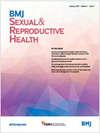作者对“注射孕激素避孕与铜宫内节育器对HIV感染的影响:一项实用随机对照试验的子研究”的评论的回应。
Q Medicine
Journal of Family Planning and Reproductive Health Care
Pub Date : 2017-10-01
DOI:10.1136/jfprhc-2017-101864
引用次数: 1
摘要
本文章由计算机程序翻译,如有差异,请以英文原文为准。
Authors' response to 'Comment on 'Effects of injectable progestogen contraception versus the copper intrauterine device on HIV acquisition: sub-study of a pragmatic randomised controlled trial' '.
We thank Quispe Calla and colleagues for their insightful comments1 on our article.2 We agree that basic science evidence showing that various progestogens increase HIV susceptibility is compelling. We also agree that randomised clinical trials (RCTs) are informative regarding the relative risks of HIV between contraceptive alternatives, but not the absolute risks …
求助全文
通过发布文献求助,成功后即可免费获取论文全文。
去求助
来源期刊

Journal of Family Planning and Reproductive Health Care
OBSTETRICS & GYNECOLOGY-
CiteScore
0.84
自引率
0.00%
发文量
0
审稿时长
>12 weeks
期刊介绍:
The trading of Professional, Managerial & Healthcare Publications Ltd has been transferred to its parent company, Keyways Publishing Ltd.
 求助内容:
求助内容: 应助结果提醒方式:
应助结果提醒方式:


